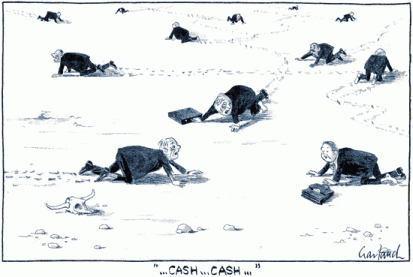
[The Telegraph, U.K.]
Nachrichten,
Switzerland
America's Financial
Crisis: It's Time to 'De-Deregulate'
"Legal regulation seems
the only way to rein in the apparently boundless greed - because bankers,
speculators, hedge-fund managers and other stock market players large and small
- and not only in the U.S. - seem to have lost the capacity to distinguish
between freedom and foolishness."
By Patrik Etschmayer
Translated By Patrik Etschmayer
March 31, 2008
Switzerland
- Nachrichten - Original Article (German)
The promises were big and
for several years the results seemed to confirm the prophets: The deregulation
of the U.S.-banking system in 1999 opened up unbelievable opportunities in the
United States for international and national banks to make money and amass
power.
After 1933, as a
consequence of the investment panic of 1929 and the subsequent Great
Depression, the U.S. put into force the Glass-Steagal Act  .
After the passage of this law, it was no longer possible for U.S.-Banks to take
part in the savings and loan business as well as trade in securities [stocks].
.
After the passage of this law, it was no longer possible for U.S.-Banks to take
part in the savings and loan business as well as trade in securities [stocks].
As a result there was a
curtailment of smaller, regional banks - strict controls were imposed on these
institutions. It might have been an economic disadvantage, but on the other
hand, one must recognize that the United States went another 50 years without
another banking crisis.
Only when regulations were
relaxed under Ronald Reagan did the first rather costly banking disaster ensue:
The Savings and Loan crisis  . This led to the
recession of the early 1990s, which helped secure Bill Clinton's 1992 electoral
victory. But Clinton didn't heed the warning. Even though it is now no longer
discussed and all fingers point toward George W. Bush - his actions alone could
not have resulted in today's disaster. That required something more. One of
Clinton's central slogans was that the "Era of Big Government" was
over, and that from now on, the State would stay out of the economy.
. This led to the
recession of the early 1990s, which helped secure Bill Clinton's 1992 electoral
victory. But Clinton didn't heed the warning. Even though it is now no longer
discussed and all fingers point toward George W. Bush - his actions alone could
not have resulted in today's disaster. That required something more. One of
Clinton's central slogans was that the "Era of Big Government" was
over, and that from now on, the State would stay out of the economy.
Clinton worked until
almost the end of his term to abolish Glass-Steagal. The Congress fought him
for years just as it had under Reagan and Bush the First. But in 1997, the FED
Board of Directors under Alan Greenspan eliminated rules that limited securities
trading for savings banks.
Finally in 1999, the
U.S.-government along with the Republican-dominated houses of Congress,
successfully eliminated Glass-Steagal. A driving force of the move was Clinton
Treasury Secretary Robert Rubin  ,
who, only days after the law was passed - resigned to become the CEO of the
first major American financial conglomerate to form after the big recession:
Citigroup [See information box, right]. Interestingly, he is now a top adviser
on the campaign team of Hillary Clinton.
,
who, only days after the law was passed - resigned to become the CEO of the
first major American financial conglomerate to form after the big recession:
Citigroup [See information box, right]. Interestingly, he is now a top adviser
on the campaign team of Hillary Clinton.
[Editor's Note:
Essentially, the Gramm-Leach-Bliley Act permitted commercial and investment
banks to consolidate, eliminating the restrictions imposed by Glass-Steagal
after the 1929 crash  ].
].
Posted by WORLDMEETS.US
It didn't even take ten
years to prove that money is too precious to be left to banks alone. The
argument was always that the private sector is best left to regulate itself
without any statutory limitations. Even now, this is the claim of
liberalization gurus: Federal intervention to save the banks creates even worse
problems. This would be all well and good if only the guilty were pulled into
the abyss. But it is they who have long-since bled the sheep dry, having passed
along the ticking time bomb.
Legal regulation seems to
be the only way to rein in the apparently boundless greed - because bankers,
speculators, hedge-fund managers and other stock market players large and small
- and not only in the United States - seem to have lost the capacity to distinguish
between freedom and foolishness. A sure sign that it's time to de-deregulate.
Posted by WORLDMEETS.US
CLICK HERE FOR GERMAN
VERSION
[Posted by WORLDMEETS.US April
4, 10:38am]